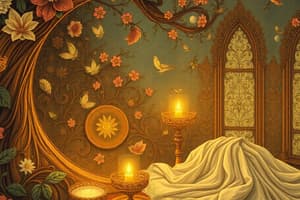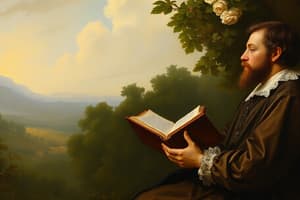Podcast
Questions and Answers
What is the unique characteristic of a sonnet?
What is the unique characteristic of a sonnet?
- It has a carefully patterned rhyme scheme (correct)
- It is always written in prose
- It has 12 lines
- It is written in free verse
What distinguishes a dramatically monologue from other poetry forms?
What distinguishes a dramatically monologue from other poetry forms?
- Use of complex rhyme schemes
- Multiple speakers expressing different views
- Exclusively found in written poetry
- Direct address to an imaginary audience by a single speaker (correct)
Which of the following features is typical of a ballad?
Which of the following features is typical of a ballad?
- Complex language and intricate metaphors
- Lack of any rhyming scheme
- Long, descriptive passages
- Simple, direct language and vivid storytelling (correct)
What is the main theme typically explored in elegies?
What is the main theme typically explored in elegies?
Which poetry form is characterized by its portrayal of deep emotions and thoughts through an imaginary audience?
Which poetry form is characterized by its portrayal of deep emotions and thoughts through an imaginary audience?
What type of poem is often written in a formal, mournful style and explores themes of loss, grief, and remembrance?
What type of poem is often written in a formal, mournful style and explores themes of loss, grief, and remembrance?
In which form of poetry would you commonly find rhymed quatrains and a repeated refrain?
In which form of poetry would you commonly find rhymed quatrains and a repeated refrain?
Which form of poetry is known for expressing personal thoughts, feelings, and experiences in the first person?
Which form of poetry is known for expressing personal thoughts, feelings, and experiences in the first person?
Which type of poem is characterized by a strict stanzaic structure and the use of formal language?
Which type of poem is characterized by a strict stanzaic structure and the use of formal language?
What type of poem tells the story of a hero or heroes with a wide cast of characters and a complex plot?
What type of poem tells the story of a hero or heroes with a wide cast of characters and a complex plot?
Which poetic form is known for its emotional depth and exploration of personal themes?
Which poetic form is known for its emotional depth and exploration of personal themes?
What type of poem is often crafted with a concise and powerful structure, allowing poets to explore different aspects of the human experience?
What type of poem is often crafted with a concise and powerful structure, allowing poets to explore different aspects of the human experience?
Flashcards are hidden until you start studying
Study Notes
Poetry Forms: Sonnet, Ballad, Dramatically Monologue, Elegy, Ode, Lyric, Epic
Poetry is a form of literature that uses language to evoke emotions, images, and ideas. Poetry has a long history and diverse forms, each with its unique characteristics. In this article, we will explore the subtopics of poetry forms, focusing on the sonnet, ballad, dramatically monologue, elegy, ode, lyric, and epic.
Sonnet
A sonnet is a fourteen-line poem in iambic pentameter with a carefully patterned rhyme scheme. It originated in Italy and was popularized in England by William Shakespeare. Sonnets often explore themes of love, beauty, or nature and are known for their concise, powerful expressions.
Ballad
A ballad is a narrative poem that tells a story about a person or event. It is typically written in rhymed quatrains (four-line stanzas) and often includes a repeated refrain. Ballads are often sung and are known for their simple, direct language and vivid storytelling.
Dramatically Monologue
A dramatically monologue is a type of lyric poem where a single speaker expresses their thoughts and feelings to a silent listener. It is often found in drama and is characterized by its direct address to an imaginary audience. This form allows the poet to delve deeply into the character's emotions and thoughts, providing a nuanced portrayal of their inner world.
Elegy
An elegy is a lyric poem that mourns the death of a particular person. It is often written in a formal, mournful style and explores themes of loss, grief, and remembrance. The elegy form has a long history, dating back to ancient Greece and Rome, and is still used today to pay tribute to the deceased.
Ode
An ode is a longer, more formal type of lyric poem that is serious or meditative in nature. It is often written about public events or important themes and is characterized by its strict stanzaic structure and use of formal language. The ode form has its origins in ancient Greece and Rome and has been used by poets throughout history to explore a wide range of themes and emotions.
Lyric
Lyric poetry is a form of poetry that expresses the poet's personal thoughts, feelings, and experiences. It is often written in the first person and is characterized by its emotional depth and exploration of personal themes. Lyric poetry has a long history and has been used by poets to explore a wide range of emotions and experiences.
Epic
An epic is a narrative poem that tells the story of a hero or heroes and their adventures. It is often long and detailed, with a wide cast of characters and a complex plot. Epics are characterized by their grand scale and their exploration of themes of heroism, courage, and the human condition. The epic form has its origins in ancient Greece and Rome and has been used by poets throughout history to tell epic stories of heroism and adventure.
In conclusion, poetry forms are diverse and offer poets a wide range of possibilities for expression. From the concise and powerful sonnet to the sweeping epic, each form has its unique characteristics and allows poets to explore different aspects of the human experience.
Studying That Suits You
Use AI to generate personalized quizzes and flashcards to suit your learning preferences.




